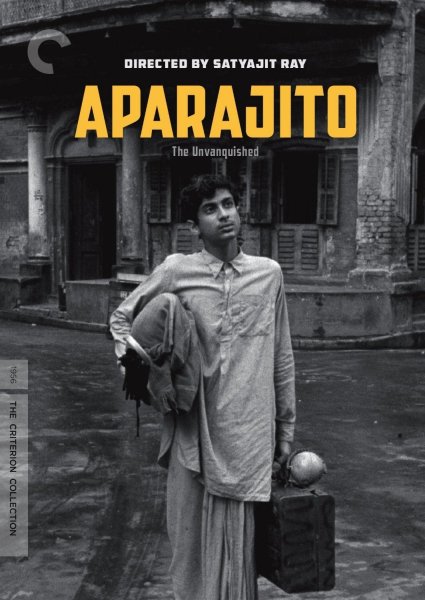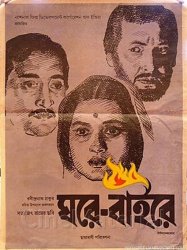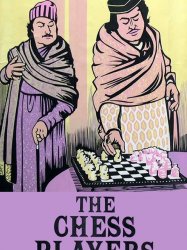Aparajito is a indian film of genre Drama directed by Satyajit Ray released in USA on 28 april 1959 with Karuna Banerjee
Aparajito (1956)

If you like this film, let us know!
Aparajito (Bengali: অপরাজিত Ôporajito; The Unvanquished) is a 1956 Indian Bengali drama film directed by Satyajit Ray, and is the second part of The Apu Trilogy. It is adapted from the last one-fifth of Bibhutibhushan Bannerjee's novel Pather Panchali and the first one-third of its sequel Aparajito. It starts off where the previous film Pather Panchali ended, with Apu's family moving to Varanasi, and chronicles Apu's life from childhood to adolescence in college, right up to his mother's death, when he is left all alone.
When Ray started making Pather Panchali, he had no plans of following it up with a sequel. The critical and commercial success of the film prompted him to start making Aparajito. Unlike his previous venture, where he stayed faithful to the novel, Ray took some bold artistic decisions here, like portraying the relationship between Apu and his mother in a very different manner. As a result, in contrast to its predecessor, the film was not received well locally; Ray recalled that "as for the suburban audience, it was shocked by the portrayal of the mother and son relationship, so sharply at variance with the conventional notion of mutual sweetness and devotion".
Critical reception outside India was however overwhelmingly positive. It won 11 international awards, including the Golden Lion and Critics Award at the Venice Film Festival, becoming the first ever film to win both. Veteran film-maker Mrinal Sen said he considers it to be one of the best Indian movies he had ever seen. Bosley Crowther said that "It is done with such rare feeling and skill at pictorial imagery, and with such sympathetic understanding of Indian character on the part of Mr. Ray, that it develops a sort of hypnotism for the serene and tolerant viewer." The critical acclaim this movie received encouraged Ray to make another sequel, Apur Sansar, which was equally well received, and thus concluded one of the most critically acclaimed movie trilogies of all time, as Roger Ebert later pointed out—"The three films, which were made in India by Satyajit Ray between 1950 and 1959, swept the top prizes at Cannes, Venice and London, and created a new cinema for India—whose prolific film industry had traditionally stayed within the narrow confines of swashbuckling musical romances. Never before had one man had such a decisive impact on the films of his culture.
Synopsis
Apu and his parents, who left their home in Bengal, has moved to an apartment in Varanasi where Apu's father Harihar (Kanu Banerjee) works as a priest. Harihar dies and Sarbajaya (Karuna Banerjee) starts working as a maid. Apu and his mother return to Bengal and settle in the village Mansapota. Apu asks his mother to send him to a school. He has an inquisitive mind and studies diligently; he receives a scholarship to go to Calcutta for further studies. Sarbajaya does not want to let her son leave but she gives in and helps him prepare to leave.Actors

Karuna Banerjee
(Sarbojaya Ray)

Kali Banerjee
Comments
Leave comment :
Suggestions of similar film to Aparajito
There are 5 films with the same actors, 38 films with the same director, 62662 with the same cinematographic genres (including 4044 with exactly the same 2 genres than Aparajito), to have finally 70 suggestions of similar films.If you liked Aparajito, you will probably like those similar films :

Pather Panchali (1955)
, 2h2Directed by Satyajit Ray
Origin Inde
Genres Drama, Historical
Actors Karuna Banerjee, Sharmila Tagore, Tulsi Chakraborty
Rating81%





Harihar Roy (Kanu Banerjee) earns a meagre living as a pujari (priest) in Nischindipur, rural Bengal, and dreams of a better career as a poet and playwright. His wife Sarbajaya (Karuna Banerjee) takes care of their children, Durga (Uma Dasgupta) and Apu (Subir Banerjee), and Harihar's elderly cousin, Indir Thakrun (Chunibala Devi). Because of their limited resources, Sarbajaya resents having to share her home with the old and helpless cripple Indir. At times, Sarbajaya's taunts become offensive, forcing Indir to take temporary refuge in the home of another relative. Durga is fond of Indir and often gives her fruit she has stolen from a wealthy neighbour's orchard. One day, the neighbour's wife accuses Durga of stealing a bead necklace (which Durga denies) and blames Sarbajaya for encouraging her tendency to steal.

Kanchenjungha (1962)
, 1h42Directed by Satyajit Ray
Genres Drama
Actors Chhabi Biswas, Karuna Banerjee, Anil Chatterjee, Pahari Sanyal, Subrata Sen, Vidya Sinha
Rating77%





A wealthy family from Calcutta is on the last day of their vacation in Darjeeling, a hill station at the foot of Mount Kanchenjungha, the second highest peak of the Himalayas. Until now, they have been unable to catch a glimpse of the peak Kanchenjungha.The family members are dominated by the father, Indranath (Chhabi Biswas), an industrialist. He wants his daughter to marry a man of his choice and hopes that the man will propose if they are left together alone for some time.

Devi (1960)
, 1h33Directed by Satyajit Ray
Genres Drama
Themes Films about religion
Actors Soumitra Chatterjee, Sharmila Tagore, Chhabi Biswas, Anil Chatterjee, Karuna Banerjee, Santha Devi
Rating76%





Doyamorjee est la jeune bru d’un noble du Bengale, Kalindar. Après un rêve, il voit en elle la réincarnation de la déesse Kali et, malgré les réticences de son fils, lui voue une vénération démesurée. Devenue objet de culte, la jeune fille est astreinte à une vie religieuse. Jusqu’à ce que la destinée reprenne ses droits.

The Home and the World (1985)
, 2h20Directed by Satyajit Ray
Origin Inde
Genres Drama
Actors Victor Banerjee, Jennifer Kendal, Soumitra Chatterjee, Swatilekha Sengupta, Manoj Mitra
Rating74%





En 1905, la société indienne est en crise. Le gouverneur général des Indes, s'appuyant sur l'antagonisme entre Hindous et Musulmans, divise le Bengale en deux, afin de mieux pouvoir perturber l'économie locale et importer des produits anglais.

The Chess Players (1977)
, 2h9Directed by Satyajit Ray
Origin Inde
Genres Drama
Themes Jeu, Sports films, Films about chess
Actors Shabana Azmi, Farida Jalal, Richard Attenborough, Amitabh Bachchan, Sanjeev Kumar, Amjad Khan
Rating74%





The film shows in parallel the historical drama of the Indian kingdom Awadh (whose capital is Lucknow) and its Muslim Nawab Wajid Ali Shah who is overthrown by the British, alongside the story of two shatranj (chess) obsessed noblemen.

The Middleman (1976)
, 2h11Directed by Satyajit Ray
Genres Drama
Actors Deepankar De, Aparna Sen, Pradip Mukherjee, Utpal Dutt, Santosh Dutta, Rabi Ghosh
Rating83%





The film portrays the hopelessness of the middle-class, educated, urban youth in modern India.

An Enemy of the People (1990)
, 1h39Directed by Satyajit Ray
Origin Inde
Genres Drama
Themes Films based on plays
Actors Soumitra Chatterjee, Ruma Guha Thakurta, Mamata Shankar, Dhritiman Chatterjee, Deepankar De, Subhendu Chatterjee
Rating72%





Un ennemi du peuple est une adaptation de la pièce d'Ibsen du même nom. Le docteur Ashoke Gupta (Soumitra Chatterjee) s’aperçoit que les cas de jaunisse sont en augmentation dans sa ville de Chandipur. Il fait faire des analyses, qui montrent que la maladie se répand par l’eau bénite distribuée dans le temple de la ville. Or le temple fait venir de nombreux pèlerins à Chandipur et est au cœur de l’économie de la ville. Le fondateur du temple ne veut pas admettre que de l’eau sacrée puisse contenir des bactéries dangereuses. Lorsque le docteur Gupta décide de publier ses découvertes dans le journal local, le maire de la ville, qui n’est autre que son propre frère, s'y oppose puis cherche à le discréditer en mettant en avant le fait qu’il n’est pas un hindou pratiquant.

Distant Thunder (1973)
, 1h41Directed by Satyajit Ray
Origin Inde
Genres Drama
Themes Political films, Disaster films
Actors Soumitra Chatterjee, Babita, Bobita, Sandhya Roy
Rating78%





Le film se déroule durant la Seconde Guerre mondiale, au Bengale, au début de la grande famine de 1943.

The Branches of the Tree (1990)
, 2h10Directed by Satyajit Ray
Origin Inde
Genres Drama
Actors Haradhan Bandopadhyay, Deepankar De, Soumitra Chatterjee, Ranjit Mallick, Mamata Shankar, Lily Chakravarty
Rating76%





Ananda Majumdar, a wealthy, retired industrialist, suddenly falls ill during a ceremony in honor of his seventieth birthday. Three of his sons rush immediately to his bedside. The 2nd son, Proshanto, already lives with his father. He spends his time listening to music and is mentally ill.

Company Limited (1971)
, 1h52Directed by Satyajit Ray
Genres Drama
Actors Barun Chanda, Sharmila Tagore, Haradhan Bandopadhyay, Deepankar De
Rating77%





Shyamal (Barun Chanda) is an ambitious sales manager in a British fan manufacturing firm in Calcutta, where he is expecting a promotion shortly. He is married to Dolan and lives in a company flat. He aspires to become the company director.
 Connection
Connection